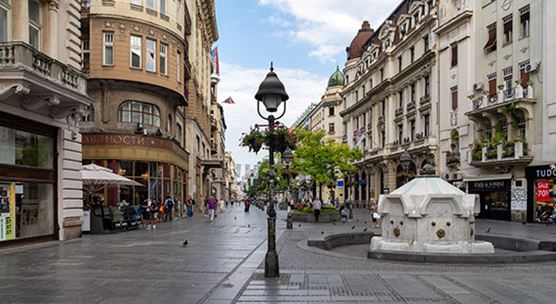The Policy Coordination Instrument (PCI)—which provides policy advice but no IMF financing—helped Serbia to maintain economic and financial stability and advance structural reforms. Although the program needed some adjustments because of the pandemic, it achieved its key objectives.
IMF Country Focus spoke with Jan Kees Martijn, the IMF’s mission chief for Serbia, and Sebastian Sosa, the IMF’s Resident Representative in Belgrade, about the program and how Serbia has fared during this difficult time.
Serbia’s PCI is coming to an end. What is your assessment of how it worked?
Martijn: The key goals of the PCI were to foster inclusive growth, maintain financial stability, and help the authorities with the implementation of ambitious structural reforms, including to sustain the earlier improvement in the fiscal position. The program was broadly on track when COVID-19 hit, but the program’s objectives had to be adjusted to reflect additional challenges posed by the pandemic. Last spring, the focus of the PCI shifted to supporting the economy through the crisis and managing risks.
Sosa: With our support, Serbia implemented a large policy response to address the economic and social effects of the pandemic. The fiscal package was among the largest in emerging Europe. It included increased healthcare spending, wage subsidies, universal cash transfers, and a state guarantee scheme for bank loans to small and medium-sized enterprises. The central bank cut the key policy interest rate, injected liquidity into the banking system, and introduced a moratorium on bank loan repayments.
At the same time, reforms to strengthen the governance of state-owned enterprises and to develop capital markets were delayed, and public employment and public wage reforms have not yet been implemented. But good progress has been made in modernizing tax administration, strengthening public investment frameworks, and monitoring and managing fiscal risks, although further efforts are needed.
Serbia’s economic contraction in 2020 is among the smallest in Europe. What are the reasons?
Sosa: A very recent estimate by the authorities puts the contraction of real GDP in 2020 at only 1.1 percent. This smaller contraction reflects several factors. First, the strong growth momentum going into the crisis—5.2 percent in the first quarter of 2020 compared with the same quarter in 2019. Second, the structure of the economy, with its modest reliance on high-contact intensive sectors such as tourism and a relatively large share of agriculture and food-related industries, which were less severely affected by the pandemic. Finally, the substantial policy response, which has supported businesses and jobs.
Despite the relatively lower decline in economic activity, the impact of the pandemic has still been significant, with real GDP in 2022 expected to be 4 percent points below pre-COVID-19 projections.
Serbia was one of the few Balkan countries that did not turn to the IMF for financial assistance during the COVID-19 pandemic. Why?
Sosa: The cost of the fiscal response to the crisis, coupled with the decline in revenues due to the fall in activity, brought the fiscal deficit up to almost 9 percent of GDP in 2020. However, Serbia managed to meet its larger financing needs in the bond market, both external and local. After a short period of tightening financing conditions in April, Serbia was able to return to international markets in early May, issuing a EUR 2 billion Eurobond. And in December, a 10-year Eurobond worth $1.2 billion was successfully issued at a relatively low yield.
Local banks’ appetite for government securities has also recovered since May and international financial institutions other than the IMF have offered sizable financing and bilateral loans. From an external perspective, Serbia’s balance of payment needs have stayed manageable, despite the sharp contraction in remittances and foreign direct investment. Foreign reserves, in fact, have remained broadly stable during 2020.
What are Serbia’s main economic challenges going forward?
Martijn: The main challenge is to sustain a solid economic recovery in 2021, when most of the crisis measures have expired. Also, uncertainty about the course of the pandemic and the delayed effects it may have on the financial health of firms and households remains very high, and additional policies to support the economy and vulnerable groups could become necessary.
Meanwhile, structural reforms need to be accelerated to transform Serbia into a dynamic, private sector-driven market economy. This will also help prepare Serbia to successfully join the EU Single Market, a long-standing ambition of the authorities. Improving the quality of institutions and governance, which includes having well-governed and managed state-owned enterprises, is a priority. Further addressing Serbia’s infrastructure gaps would help to support competitiveness, foreign investment, and integration into regional and global value chains. Fighting informality would facilitate doing business, while also generating higher fiscal revenues. Finally, a strengthened commitment to fight corruption, enhance the rule of law, and improve the efficiency of the court system would improve the business climate and foster long-term economic growth.
Will the IMF remain engaged after the end of the current PCI?
Martijn: The Serbian authorities have expressed interest in a new IMF program and made clear that they do not need IMF financing. Therefore, there could be a successor PCI, which could help Serbia during the recovery from the pandemic. Such a program would support the continuation of policies to strengthen macroeconomic stability and the resilience of the financial sector, while also continuing to implement structural and institutional reforms.
A new PCI would require not only agreement on fiscal, monetary, and financial policies but also an ambitious reform agenda that could be endorsed and supported by the IMF. The IMF will also remain engaged through the provision of technical assistance in many areas, including tax administration reform, public financial management, and fiscal statistics.








